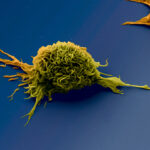Link to Pubmed [PMID] – 24952246
Link to DOI – 10.1016/j.jim.2014.06.008
J Immunol Methods 2014 Oct; 412(): 1-13
Phago-lysosome formation is important for cell-autonomous immunity to intracellular pathogens, antigen presentation and metabolism. A hallmark feature of phago-lysosomal compartments is that they undergo progressive luminal acidification controlled by the activation of vacuolar V-ATPase. Acidification is required for many enzymatic processes taking place in phago-lysosomes, like proteolysis, and supports the microbicidal activity of macrophages. Here we present a new quantitative methodology to assess phagosome acidification by flow cytometry based on the use of bi-fluorescent particles. This method relies on the use of UV polystyrene beads labelled with the acid sensor pHrodo-succinimidyl ester (pHrodo(TM) SE red) and enables us to dissociate particle association with phagocytes from their engulfment in acidified compartments. This methodology is well suited to monitor the acidification of phagosomes formed in vivo after fluorescent bead administration.

